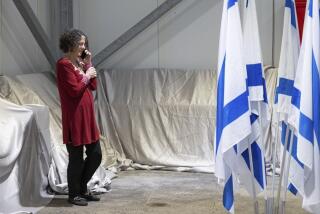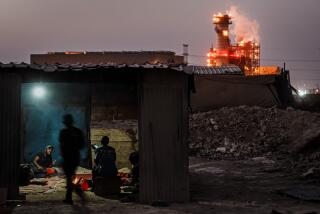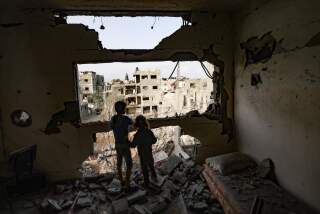Innocent Victims Include the Children at Home : Port Hueneme: Seabee wives worry for their husbands in Saudi Arabia--and for their sons and daughters here. But they are relieved battle has started.
- Share via
Mac tries to write letters to his father in Saudi Arabia, but he can’t. It’s too painful. For hours at a time, the 13-year-old closes himself in his room, turns up his rock music and stares at the TV news as the events unfold in the Middle East.
When Michelle’s father calls her family from his base in Saudi Arabia, she refuses to talk to him. The 8-year-old runs and hides.
Little by little, the pressures of the war are turning the lives of these Ventura County children upside down.
This week, officials at the Navy Family Service Center at the base in Port Hueneme stepped up their counseling efforts because of problems the conflict has caused the Seabees’ youngsters. Support groups have been formed to address the concerns of the children and adolescents.
“It’s hard on them,” said Barbara Oostdyk, whose husband, a Seabee, is in Saudi Arabia. “They’re growing up a lot faster than other children. They’re seeing things, unfortunately, that other children have not had to face.”
ere are 1,200 men from two Port Hueneme naval battalions who have been sent to Saudi Arabia. On Friday, base officials and a group of seven Seabee wives gathered with the media at Port Hueneme City Hall to discuss the impact the war was having on their lives.
The wives said they are relieved the war has started.
“You can’t have an end until you have a beginning,” one woman said. But several said they were worried about their children.
“My son writes letters to my husband all the time, but he never finishes them,” said Judith Priest of her son, Mac. “It’s bothering him terribly and he keeps it inside a lot.”
Priest said she kept Mac home from school Thursday, the day after the U.S.-led forces bombed Iraq, because he was so upset.
“His anxieties were pretty tight,” Priest said. “I figured if he stayed at home, maybe he would get it out. . . .He still doesn’t understand.”
Oostdyk said that when her husband was sent to Saudi Arabia at the onset of the crisis, her four children where somewhat intrigued.
“They wanted pictures of camels and sand,” Oostdyk said. “So my husband sent back sand in a big Tupperware container.”
But the novelty soon wore off. Oostdyk’s children wanted to know when their dad was coming home--a question she could not answer.
Oostdyk’s daughter, Michelle, decided she did not want to talk to her father when he called.
“She just can’t cope with him being over there,” Oostdyk said, dabbing tears from her eyes. “She just ignores it . . . she’s angry that he’s gone.”
Richard Deamer, the medical director of Vista Del Mar, a private psychiatric hospital, said in an interview that the reactions of the Seabees’ children are normal.
“The wrenching separation and the possibility that dad might be killed is overwhelming,” Deamer said.
He said he tells base officials that support groups are one of the best ways to help children understand their feelings of loss.
“They need to talk about these things and share,” he said. “They need to know it’s OK to feel this way.”
Debbie Sanders said her daughters, ages 3 years and 21 months, are too young to understand about the war--they simply miss their father. “They’re still dealing with their longing for their dad,” she said.
Sandy Fedbrugge said she questions how much her 4-year-old son understands. “I don’t really know how he feels,” she said. “I’m concerned about him.”
But at least now that the conflict has started, the wives can see an end to the emotional roller coaster they and their children have been on since the conflict began almost six months ago, Lucinda Connelly said.
“The waiting is over,” she said.
Wendy Petersen, whose husband is working as a dentist for the troops, added: “There’s a sense of relief. There’s now a beginning and there will be an end.”
More to Read
Sign up for Essential California
The most important California stories and recommendations in your inbox every morning.
You may occasionally receive promotional content from the Los Angeles Times.













